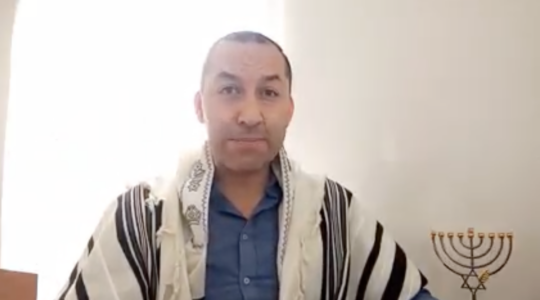WARSAW, Poland (JTA) – The Polish Senate passed legislation that criminalizes accusing the Polish state of the crimes committed by the Germans during World War II.
The amendment to the Act on the Institute of National Remembrance was adopted early Thursday morning by a vote of 57-23, with two abstentions.
The legislation, designed to make it clear that Nazi Germany is responsible for the crimes against humanity that took place in the camps, was approved last week by the lower house of the Polish Parliament, or Sejm. The legislation must still be signed by the country’s president.
The law would make it illegal to use terms such as “Polish death camps” to describe the camps set up by the Nazis in Poland. Violation of the law could result in up to three years in prison. It contains a provision to exclude scholarly or academic works.
Israeli lawmakers, Yad Vashem, the U.S. Holocaust Memorial Museum and scholars have criticized the law.
On Sunday, Poland’s president, Andrzej Duda, said in a statement that he would carefully review the legislation.
“Everyone whose personal memory or historical research speaks the truth about the crimes and shameful behavior that occurred in the past with the participation of Poles has full right to this truth,” he said.
The same day, Israel and Poland announced that they would open an “immediate dialogue” over the legislation.
Eight U.S. members of Congress signed a joint letter on the legislation to Duda. The American lawmakers point out that Poland was one of the countries that suffered the most during World War II, and recall the merits of many Poles who, despite the threat of the death, saved Jews.
“However, many cases have also been documented where Poles — directly or indirectly — assisted the Nazis in murdering innocent Jews. Punishing anyone for talking about these facts would be an injustice,” the lawmakers wrote.
Patryk Jaki, the author of the legislation, said during debate in the Polish Senate that “Poland was the only occupied country in which no local SS group was active, there was no institutional cooperation with Hitler, which there was in stronger countries.”
Jaki said that Polish citizens tried to sue German newspapers for use of the term “Polish death camps,” but the courts refused because citizens did not have the right to appear on behalf of the state.
In January, a German court in Koblenz issued a verdict ordering ZDF television to apologize for using the term “Polish death camps.” The station had been sued by former Auschwitz inmate Karol Tendera. The court in Koblenz found that there had been a violation of Tendera’s personal rights and ordered publication of the apology. ZDF may appeal the judgment.
Jaki wants the Poles to show their successes in saving Jews and talk about heroes, such as Witold Pilecki, who informed the world about Auschwitz, and publicize the Righteous Among the Nations who saved Jews and the Polish people who helped in deciphering Nazi code.
Jaki said that no one could have predicted Israel’s reaction to the legislation.
“No one was aware that Israel would protest at all,” he said. “There was no signal over that last year that there would be a protest against this law. How could we know? The ambassador’s task was to signal if she has any comments. Let us assume that if there is a dispute, Poland is not always guilty. Let’s look at what words Israeli politicians are using towards Poland now.”
Jaki said he was meeting intensively with Israeli Ambassador Anna Azari, but they were mainly talking about reprivatization of Jewish property and assets.
Jan Dziedziczak, secretary of state in the Ministry of Foreign Affairs, said the new law is part of a struggle for Poland’s reputation on the international stage.
“Our country always stood on the side of the weaker: We first said ‘no’ to Hitler and did not collaborate,” he said. The Polish Underground State unambiguously decided to save Jews. We know it, but now the world has a different picture.”
Dziedziczak dismissed comments by Israeli lawmaker Yair Lapid, the son of a Holocaust survivor, who said there was complicity by Poles in the Holocaust.
“This is the proof that this law is essential,” said the Polish official.
The deputy speaker of the Senate, Bogdan Borusewicz, filed a proposal to reject the new law. He said that Jewish organizations in the U.S. supported Polish efforts to join NATO and “fought with the term ‘Polish camps’ with us.”
“This is our most important ally. Now we are entering into conflict with the United States,” he said. “This law makes the seams of anti-Semitism that are in the Polish nation come to the surface. The Polish government is responsible for this.”
Senate Speaker Stanisław Karczewski said the legislation was written “to look after the good name of Poland.”
“We want the Jews to be our friends. We will meet, debate, talk,” he said.
The U.S. State Department on Wednesday criticized the Polish legislation, which it said “could undermine free speech and academic discourse.” According to the State Department’s statement, the bill “could have [repercussions] on Poland’s strategic interests and relationships – including with the United States and Israel. The resulting divisions that may arise among our allies benefit only our rivals.”
Meanwhile, a demonstration of Polish national organizations planned Wednesday in front of the Israeli Embassy in Warsaw did not take place. The organizers canceled the event after officials issued a ban on closing streets near the embassy. The ban is valid until Feb. 5. Nationalists said they would meet on social media instead of at the embassy.
Lawmaker Robert Winnicki, who heads an ultranationalist organization in Poland, in a news conference in the Sejm on Wednesday said that “Poland has been subject of attack by the Israeli elite and Jewish circles in the world for many days.” He said making it impossible to organize a demonstration next to the Israeli Embassy is to limit the “voice of citizens who wanted to defend Polish dignity.” Winnicki called the decision “scandalous and unacceptable.”
“It’s false that we had an excellent relationship with Israel,” he said. “We really had a unilateral unrequited love of the Polish political class to Israel.” The lawmaker urged the Polish government to “rise from its knees in its relations with Israel.”
Winnicki also said he resents that an amendment to the Act on the Institute of National Remembrance was reviewed with the Israeli ambassador. He also called Poland a “hostage” to the United States.
“We have a lot to do with Arab countries,” he said. “It is not our business to stand by Israel’s side. We must behave with dignity.”
JTA has documented Jewish history in real-time for over a century. Keep our journalism strong by joining us in supporting independent, award-winning reporting.






